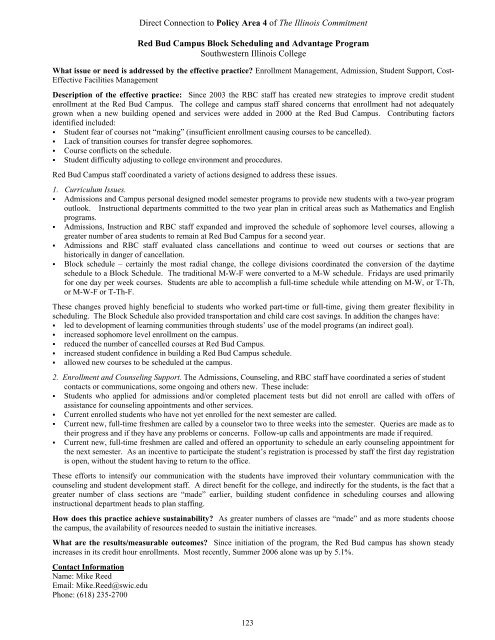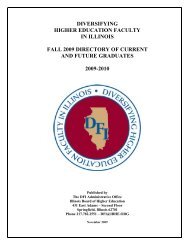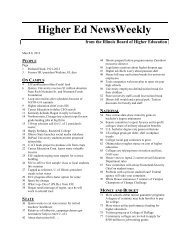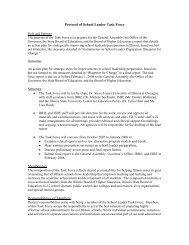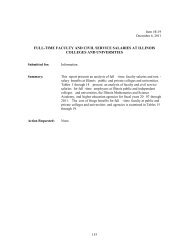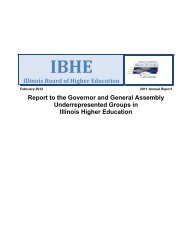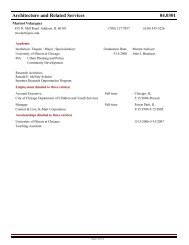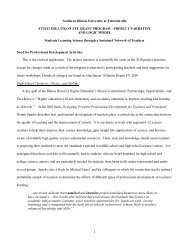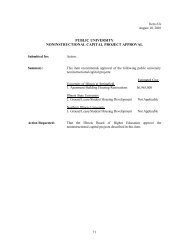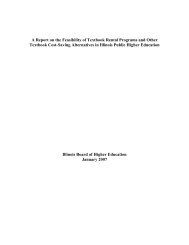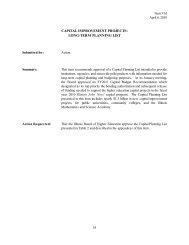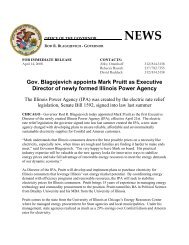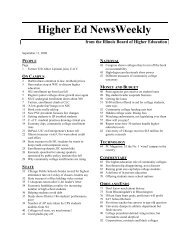Title of Effective Practice: - California Postsecondary Education ...
Title of Effective Practice: - California Postsecondary Education ...
Title of Effective Practice: - California Postsecondary Education ...
Create successful ePaper yourself
Turn your PDF publications into a flip-book with our unique Google optimized e-Paper software.
Direct Connection to Policy Area 4 <strong>of</strong> The Illinois Commitment<br />
Red Bud Campus Block Scheduling and Advantage Program<br />
Southwestern Illinois College<br />
What issue or need is addressed by the effective practice? Enrollment Management, Admission, Student Support, Cost-<br />
<strong>Effective</strong> Facilities Management<br />
Description <strong>of</strong> the effective practice: Since 2003 the RBC staff has created new strategies to improve credit student<br />
enrollment at the Red Bud Campus. The college and campus staff shared concerns that enrollment had not adequately<br />
grown when a new building opened and services were added in 2000 at the Red Bud Campus. Contributing factors<br />
identified included:<br />
• Student fear <strong>of</strong> courses not “making” (insufficient enrollment causing courses to be cancelled).<br />
• Lack <strong>of</strong> transition courses for transfer degree sophomores.<br />
• Course conflicts on the schedule.<br />
• Student difficulty adjusting to college environment and procedures.<br />
Red Bud Campus staff coordinated a variety <strong>of</strong> actions designed to address these issues.<br />
1. Curriculum Issues.<br />
• Admissions and Campus personal designed model semester programs to provide new students with a two-year program<br />
outlook. Instructional departments committed to the two year plan in critical areas such as Mathematics and English<br />
programs.<br />
• Admissions, Instruction and RBC staff expanded and improved the schedule <strong>of</strong> sophomore level courses, allowing a<br />
greater number <strong>of</strong> area students to remain at Red Bud Campus for a second year.<br />
• Admissions and RBC staff evaluated class cancellations and continue to weed out courses or sections that are<br />
historically in danger <strong>of</strong> cancellation.<br />
• Block schedule – certainly the most radial change, the college divisions coordinated the conversion <strong>of</strong> the daytime<br />
schedule to a Block Schedule. The traditional M-W-F were converted to a M-W schedule. Fridays are used primarily<br />
for one day per week courses. Students are able to accomplish a full-time schedule while attending on M-W, or T-Th,<br />
or M-W-F or T-Th-F.<br />
These changes proved highly beneficial to students who worked part-time or full-time, giving them greater flexibility in<br />
scheduling. The Block Schedule also provided transportation and child care cost savings. In addition the changes have:<br />
• led to development <strong>of</strong> learning communities through students’ use <strong>of</strong> the model programs (an indirect goal).<br />
• increased sophomore level enrollment on the campus.<br />
• reduced the number <strong>of</strong> cancelled courses at Red Bud Campus.<br />
• increased student confidence in building a Red Bud Campus schedule.<br />
• allowed new courses to be scheduled at the campus.<br />
2. Enrollment and Counseling Support. The Admissions, Counseling, and RBC staff have coordinated a series <strong>of</strong> student<br />
contacts or communications, some ongoing and others new. These include:<br />
• Students who applied for admissions and/or completed placement tests but did not enroll are called with <strong>of</strong>fers <strong>of</strong><br />
assistance for counseling appointments and other services.<br />
• Current enrolled students who have not yet enrolled for the next semester are called.<br />
• Current new, full-time freshmen are called by a counselor two to three weeks into the semester. Queries are made as to<br />
their progress and if they have any problems or concerns. Follow-up calls and appointments are made if required.<br />
• Current new, full-time freshmen are called and <strong>of</strong>fered an opportunity to schedule an early counseling appointment for<br />
the next semester. As an incentive to participate the student’s registration is processed by staff the first day registration<br />
is open, without the student having to return to the <strong>of</strong>fice.<br />
These efforts to intensify our communication with the students have improved their voluntary communication with the<br />
counseling and student development staff. A direct benefit for the college, and indirectly for the students, is the fact that a<br />
greater number <strong>of</strong> class sections are “made” earlier, building student confidence in scheduling courses and allowing<br />
instructional department heads to plan staffing.<br />
How does this practice achieve sustainability? As greater numbers <strong>of</strong> classes are “made” and as more students choose<br />
the campus, the availability <strong>of</strong> resources needed to sustain the initiative increases.<br />
What are the results/measurable outcomes? Since initiation <strong>of</strong> the program, the Red Bud campus has shown steady<br />
increases in its credit hour enrollments. Most recently, Summer 2006 alone was up by 5.1%.<br />
Contact Information<br />
Name: Mike Reed<br />
Email: Mike.Reed@swic.edu<br />
Phone: (618) 235-2700<br />
123


